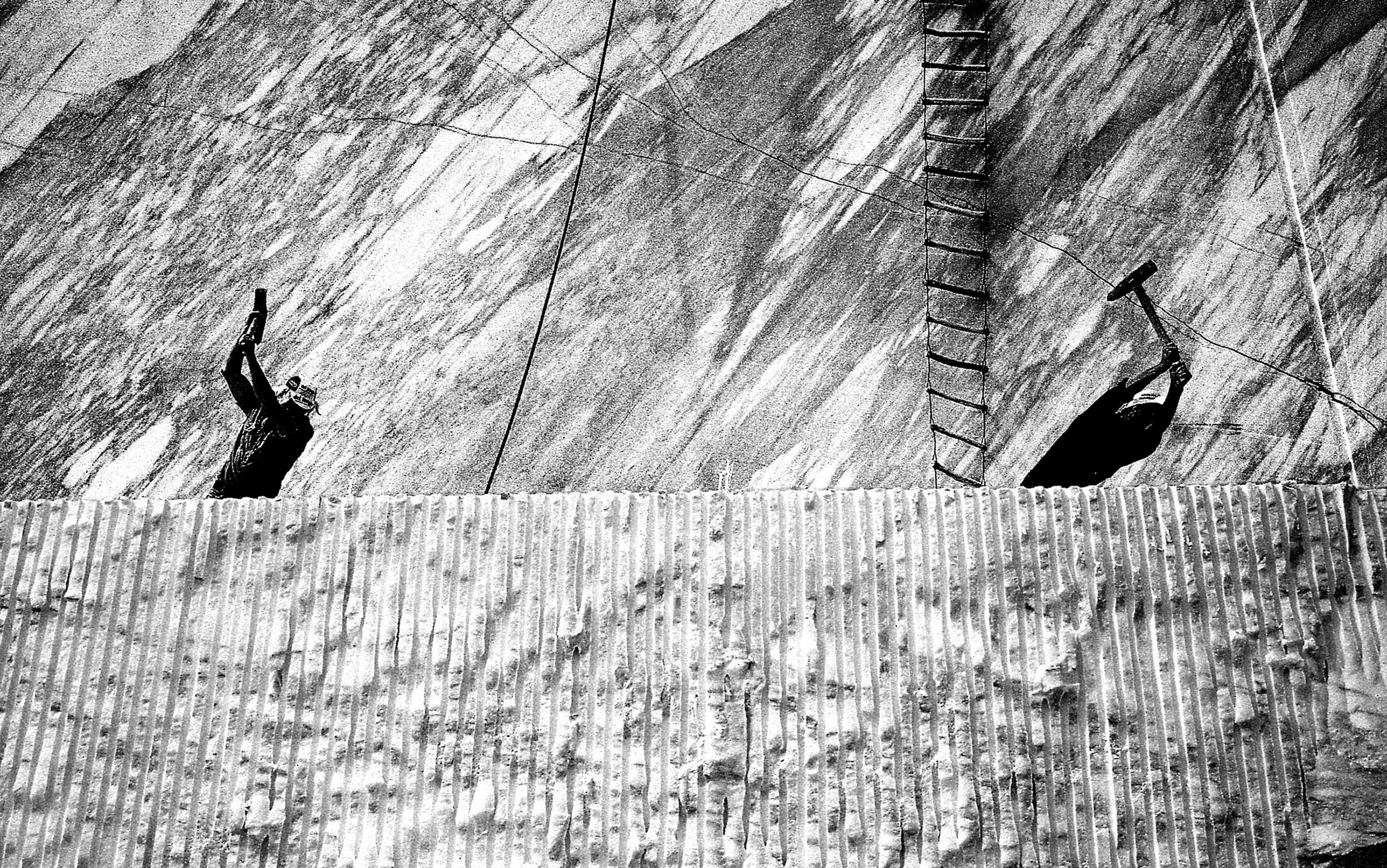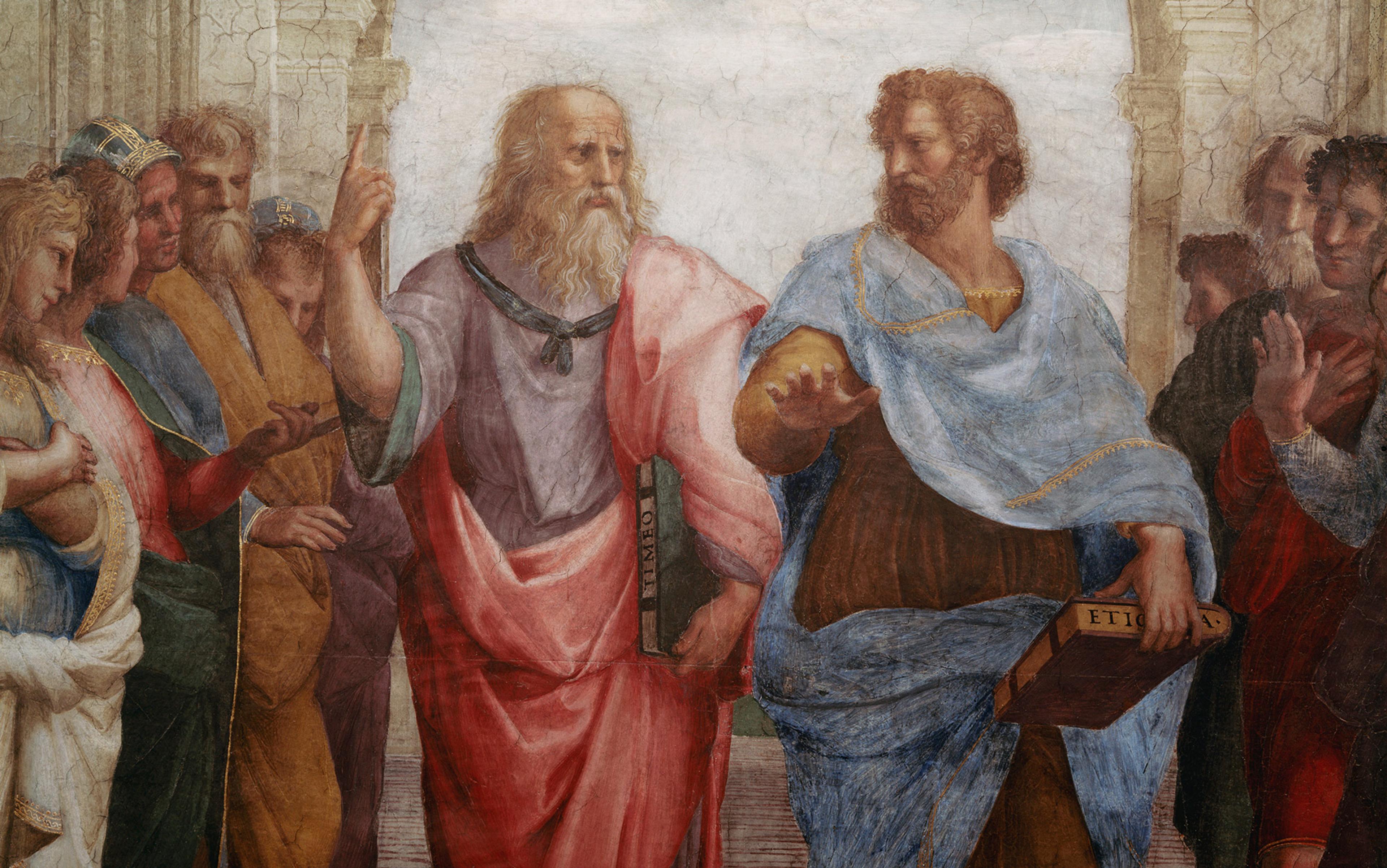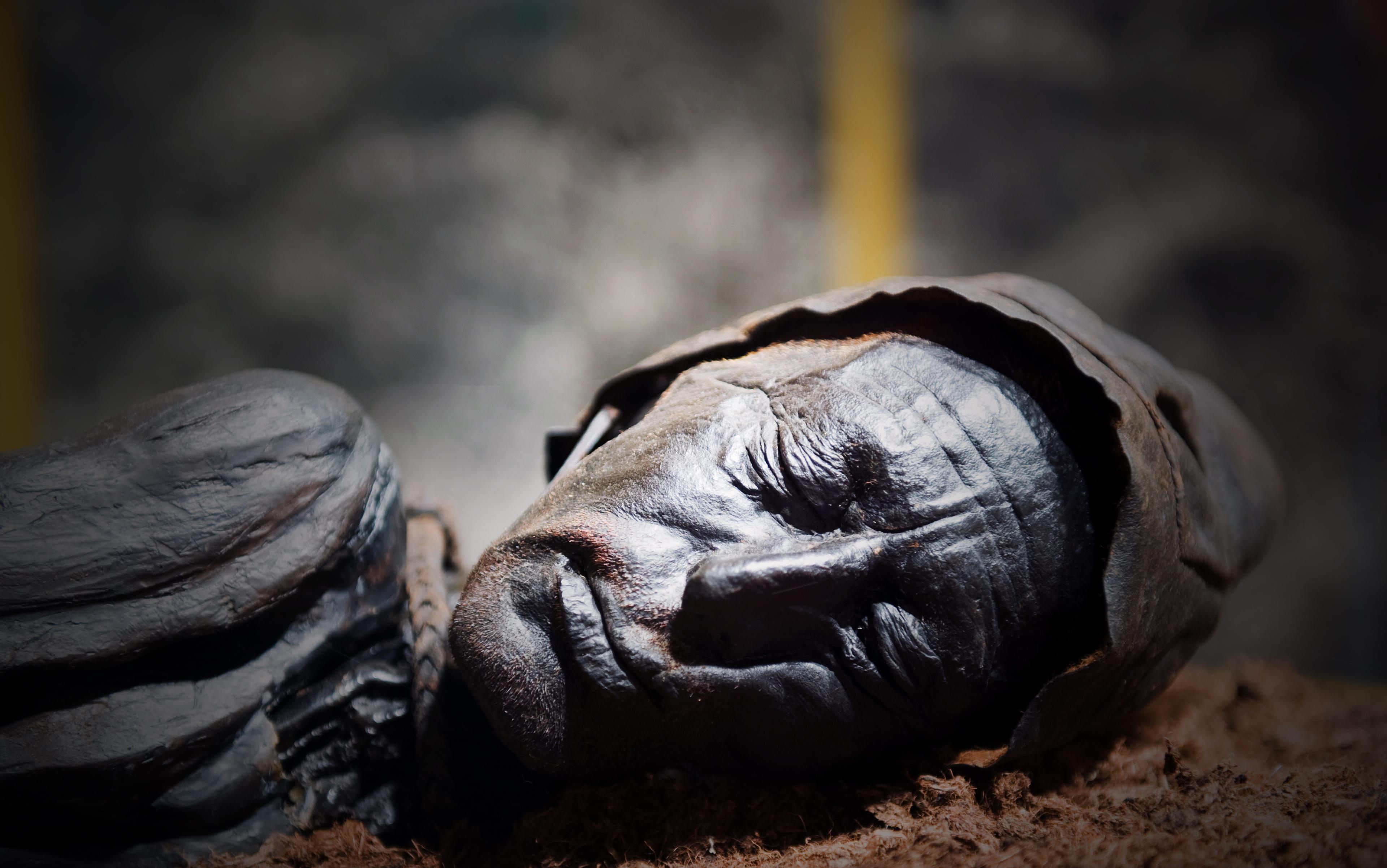In Time’s Arrow, Time’s Cycle (1987), Stephen Jay Gould tells the story of one John Playfair, who in 1788 accompanied the great British geologist James Hutton to see an ‘unconformity’ at Siccar Point in Scotland. With the help of this geological visual – an ancient erosion surface dividing two layers of rock, one gently sloping, the other vertically tilted – Hutton explained to Playfair that the Earth is a machine ceaselessly repeating a cycle of erosion, deposition, and uplift. Playfair later wrote: ‘The impression made will not easily be forgotten… Revolutions still more remote appeared in the distance of this extraordinary perspective. The mind seemed to grow giddy by looking so far into the abyss of time.’
Giddy. That’s how trying to penetrate ‘deep time’ has made people feel ever since its discovery, by science, a few hundred years ago. With a little practice, one can contemplate thousands of years, but thinking in the millions is a bit like staring into a bottomless well or crevasse. No doubt this has something to do with the name, ‘deep time’.
By now most of us have absorbed and integrated quite a large number of facts about deep time. We acknowledge that our universe began with the Big Bang about 14 billion years ago. We know that our planet has ‘gone cycling on’, to use Charles Darwin’s phrase, for about 4.5 billion years. Darwin himself didn’t know the age of the Earth, and would have been greatly relieved to hear of it, because natural selection requires hundreds of millions of years to do its creative work, to produce the vast number of forms that sprint along the Earth’s surface or splash and soar in its seas and skies. To the extent we have begun to internalise this idea of deep time, we have started to make the difficult transition from human timescales to those of science.
This is all well and good, but did you notice that all of those references to deep time have us looking backward, into history? In most of our talk about deep time, what we really have in mind is the deep past. Every day, we are reminded that we come at the end of a long evolutionary process. But there is little to stimulate the thought that we come at the very beginning of one, too. Where in all of this, one might reasonably ask, is the deep future?
It’s helpful to think about these things spatially, so imagine a line one might draw that is 20ft long, and let that stand for the ‘distance’ of a billion years. A billion years at least is needed to get you all the way from the first stirrings of human philosophy, science, and religion, about 50,000 years ago, through the immensities of time that lie ahead for species on our planet, before the Sun’s unbearable drying heat causes the evolution of life on Earth to grind to a halt. So think about that billion years of evolution, that 20ft line. How much of it have we traversed?
You’ll suspect it to be not much. But I’m guessing you won’t be prepared for how little it is. The ground we’ve covered as a species is not even discernible with our usual measuring devices. Indeed, for it to fill a visible segment of that 20ft line, say, a meagre eighth of an inch, we would have to carry on for nearly half a million years more. It takes a great deal longer than one might think for intelligent life to travel any distance at all through scientific time, and in that journey we are still disconcertingly close to the starting point. The beginning is near!
Looking forward from where we are into the abyss of future time, imagining what yet may be, is not something we’re used to doing. But it’s something I believe we ought deliberately to do much more often, in order to correct what amounts to an unbalanced outlook and to discover our place in time. To see things as they are includes seeing them as they will be, and that means picturing ourselves and our own position in time not as coming at the end, jutting out into empty space with nothing beyond, but as tucked in with manifestations of life both behind us and ahead of us. Tucked in, just as Darwin’s or Hutton’s time is for us as we look back on it now. This is how things will be.
Why has recognising the deep future been so difficult for humanity? Why, after discovering the place of the Earth in the solar system, the place of the solar system in the universe, the age of the Earth, the age of the universe, and evolution by natural selection over aeons of Earth’s history, do we still need to be prodded to perform the simple act of turning around, to position ourselves to see both forward and back in time?
The first, and most obvious reason, is simple human self-preoccupation. The line of evolution reaches us, and we find it hard to imagine it moving further. Hugely impressed with our own accomplishments, including those just listed, we give little thought to beings who might come after us or to ideas not yet a twinkle in evolution’s eye. There is also a more practical reason. Most human goals, including altruistic ones, rise or fall over the short period of a human lifetime. And although we might look back – even far back – with interest, perhaps to learn from our kind’s history, there is nothing in the far future that is similarly tied up with our goals. As a result, we haven’t developed the habits of mind necessary to consider it carefully.
The past has another kind of allure for us, one tied closely to the way we see ourselves. When we do lift our heads from immediate human concerns and exert the imagination needed to think in scientific timescales, our attention is often drawn in a special way to times gone by. As attested by hundreds of television programmes, many narrated by the enthusiastic David Attenborough, things that occurred in the recesses of evolutionary time can touch us deeply, for they affect our very sense of identity. Having discovered evolution, we now know that many secrets about who we are might be exposed by the palaeoanthropologist’s shovel or brush. But there is no bed of deposits where one can dig up the fossils of one’s descendants.
We all want to live in the most exciting, most consequential chapter of time, it seems
Finally, we can always blame the Bible. Whether you think of it as casting a long shadow across the history of Western culture or as fathering a great light within it, there is no denying the Bible’s powerful influence on the way that we think today. And you might have noticed that there’s not much about a billion-year future in it. The Bible does not tell us ‘The beginning is near!’ but rather ‘The end is near!’ When I was a child, I helped my father put an actual sign at the end of our driveway that said ‘Jesus is coming soon!’ And although his brand of enthusiastic evangelicalism sponsored endless disputes with other Christians – even other evangelicals – as to how things will transpire in the near future, on the matter of whether we are living in the end times he was in lockstep with other biblical believers. If you allow for secular eschatologies, he was also in lockstep with the rest of the culture, which has by now spun out rather a large number of variations on the biblical Armageddon-just-around-the-corner theme. We all want to live in the most exciting, most consequential chapter of time, it seems.
What might it mean to shed our temporal myopia? Perhaps we will learn to think of human enquiry – whether it be philosophical, scientific, or religious in nature – in a radically diachronic way, as spread out over enormous periods of time, including future times. This would be a nice corrective to the tendency thinkers often have to regard enquiry as identifiable with what’s going on at the moment, and as involving tasks they and their contemporaries should be able to wrap up in their own lifetimes. In 1900, Lord Kelvin, nearing the end of one of the most productive lives ever in physics, famously suggested that work in his field was virtually complete: he could detect only a few ‘minor clouds’ in the otherwise clear sky of physics. How wrong he was! Within a few years, one cloud had rained down Albert Einstein’s theory of relativity and the other quantum mechanics. Much of Lord Kelvin’s classical world lay in ruins.
Perhaps someone will soon discover how to reconcile quantum mechanics and general relativity – one of the great uncompleted scientific tasks of our time. But this so-called ‘unification’ might leave loose threads of its own. Maybe a new awareness of our place in time will lead us to see science as the laying of foundations, for discoveries that will come long after we’ve departed the scene. Maybe we will see ourselves as being involved in one of those critical turning points that can only be seen later on in the journey of the mind.
A deeper perspective in time might also bless us with a new attitude toward daring suggestions in the realm of ideas, which today are often greeted with disdain. I’m thinking of an attitude of tolerant and empathetic curiosity, fed by the desire to affect our limited intellectual capacities in ways that permit us to evolve. This empathetic curiosity would motivate us to understand why things strike someone in the different way they do, while at the same time preventing us from ridiculing or discouraging unconventional forms of enquiry that at first appear quixotic.
An illustration is afforded by Thomas Nagel’s book Mind and Cosmos (2012), which was panned by the intellectual elite for daring to suggest that a teleological conception of nature might have a role to play in future science. Teleology was largely set aside when the shift from Aristotle to Isaac Newton was negotiated: the idea that heavy bodies are drawn toward the centre of the universe, seen as the centre of the Earth, was dropped when purely mechanistic systems were devised that accurately predicted and explained a much wider array of astronomical data than Aristotle ever knew. Teleology remained outside science when much of what we learnt from Newton was supplanted by Einstein, and most scientists today suppose it ought to be gone for good. As a result, Nagel was crucified. But was this swift reaction yet another consequence of our short-sightedness?
for all we know, some of the new ideas of the future will be old ideas, whose time has finally come
It’s true that science and philosophy have limited budgets (of money and time) and that some filtering of the conversation is necessary to keep disciplines fresh and on the move. Not every intellectual whimsy can be indulged. But given our place in time, and our limited understanding, strange ideas proposed by academics, who to all appearances are full of a love of truth and have no obvious axe to grind, should be met with curiosity not a curse. We should at least let Nagel come down from the cross long enough to explain more fully the teleological view that he thinks might be needed to give consciousness a place in nature. Realising that our enquiry into the fundamental nature of the world is just beginning, we might have to say that, for all we know, some of the new ideas of the future will be old ideas, whose time has finally come.
For all we know. This critical part of my claim is that we are not in a realm where belief or confidence is appropriate. It is hard, at an early stage of any investigation into matters that resist our cognitive powers and sponsor so much disagreement, to see how belief or confidence could be the thing to emphasise. Belief says we’ve reached the end of the investigative journey. And given our place in time, we will often need to resist that siren call. What’s important is that we voluntarily accept, for now, where our peculiar pathway through the evidence has led us, and it’s important that we continue enquiry from there, interacting with the work of others in such habits of mind as the one I’ve dubbed ‘tolerant, empathetic curiosity’. As it happens, this point about focusing on acceptance rather than belief means that Nagel was just as short-sighted to countenance his book’s subtitle Why the Materialist Neo-Darwinian Conception of Nature is Almost Certainly False as were his detractors in suggesting that teleological ideas are simply beyond the pale and should be off-limits.
All of these consequences, and many others too, might be waiting for us in a proper perspective on deep time and our place in it, which cannot be far off now. None of these consequences – do notice – requires us to say that intelligent life (whether in a human form or as configured in some species coming after us) necessarily will travel on a great deal further, traversing much more of the 20ft line, or that deep new insights will necessarily be won. In particular, our travels so far through logical space – the space of ideas – might not be as near a beginning as our travels through temporal space, scientifically construed. But, by the same token, they might be. Even half the humility of Darwin will lead you to see that there might be aspects of reality we’ve not yet evolved the ability to handle intellectually. And so, allow yourself to get giddy. For all we know, human enquiry on our planet is still in its infancy.






